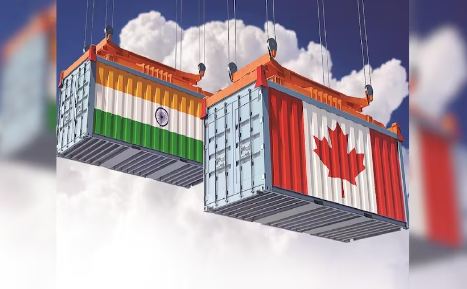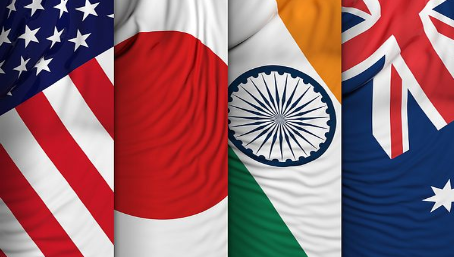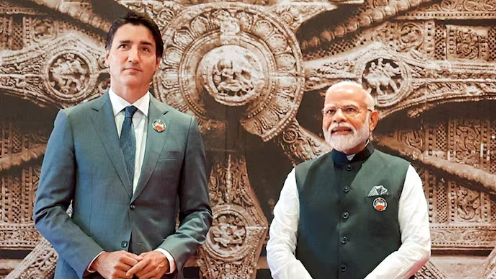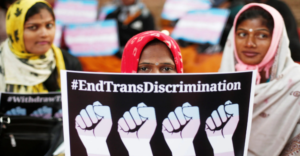WHAT HAS HAPPENED TILL NOW?
India-Canada Relations are poised to experience a prolonged pause in trade negotiations due to increasing diplomatic strains between the two nations. These tensions were exacerbated when Canadian Prime Minister Justin Trudeau levelled allegations against the Indian government, implicating them in the assassination of Hardeep Singh Nijjar. Nijjar held the position of chief within the Khalistan Tiger Force and was designated as a terrorist by Indian authorities.
Prime Minister Trudeau said there were “credible allegations” for this accusation, in front of Canadian parliament. While the Indian government has vehemently denied the allegation, a diplomatic war has started between the two nations.
The problems in India-Canada relations can be already seen during the G20 summit in New Delhi when no formal bilateral talks were held between the heads of both nations. Instead, serious concerns were raised with each other and PM Modi brought up the issue of “continuing anti-India activities of extremist elements in Canada”.
A senior Indian diplomat was expelled from Canada after Trudeau’s allegations. The Indian response was to issue a statement refuting any involvement in Nijjar’s killing and expelling a senior diplomat from Canada.
INDIA-CANADA RELATIONS: AN ECONOMIC PERSPECTIVE

The India-Canada bilateral trade amounted to about $8.16 billion in FY23. According to Tradestat, Canada was India’s 35th largest trading partner in the financial year 2022-23. Indian exports to Canada stood at $1.24 billion from April to July 2023. Major imports of Canada from India include pharmaceuticals, telecom instruments, iron and steel products. There has been an upsurge in Indian exports to Canada in the past two years at a CAGR of 32%.
Canadian exports to India comprise coal, pulses and fertilisers. India also imports masoor dal (red lentils) from Canada. India is a priority market for Canada, being its 10th largest trading partner. The India – Canada cooperation has also increased in sectors such as the mining of critical metals, education and skilled labour
According to Invest India, Canada accounts for 0.5% of the total foreign direct investment in India with a cumulative investment of $3.3 billion between April 2000 and March 2023. More than 1,000 Canadian companies are actively pursuing business in the Indian market.
Many Canadian entities have invested in India such as the Canadian Pension Plan Investment Board and asset management firm Brookfield. The country’s big pension funds include Caisse de dépôt et placement du Québec (CDPQ), having investments of about C$8 billion and the Ontario Teacher’s Pension Plan (OTPP) with $3 billion. The present tensions in India-Canada relations may not cause any problems to their position in the immediate term, however, it may cause operational inconveniences.
The India-Canada Comprehensive Economic Partnership Agreement (CEPA) talks were initiated during the Manmohan Singh-led government in 2010 but were abandoned in 2017 due to diverging viewpoints. Despite that, business and trade between both countries continued. The (CEPA) negotiations were formally re-launched in March 2022 and the two countries were keen on completing the negotiations by 2023-end. Nine rounds of talks had already taken place till July 2023. However, due to the present situation, the CEPA negotiations now stand paused.
PROBLEMS FOR INDIAN STUDENTS AND INDIAN DIASPORA
The Indian diaspora in Canada numbers 1.6 million persons of Indian origin and 700,000 non-resident Indians. The Sikh population in the country has doubled in the last 20 years, constituting about 770,000 individuals. This number is the highest population of Sikhs, only second to the state of Punjab in India.
According to official data, about 1.08 lakh Indian students study at Canadian universities, around 37% of all international students. Their fees are several times higher than domestic students. This is essential for the finances of many post-secondary schools. Students from India also rent houses in major Canadian cities in large numbers. This helps in subsidising the mortgages of houses with high interest rates.
The present strain in India-Canada relations and the advisory issued by MEA for Indian students to exercise “utmost care” in Canada would not bring good prospects for Canada.
The khalistani threat is an added source of anxiety and fear among the students. Indian intelligence agencies have cautioned against the pro-Khalistani entities (PKE) that could target Indians, Hindu temples and businesses run by Indian entrepreneurs.
In addition to this, there is also a sense of fear among educational consultants specializing in Canada, and those hoping to apply for Canadian Permanent Residency. With India stopping its visa services in Canada, concerns have also been raised over visa prospects for those aspiring for Canadian visas from India.
CANADA AND INDO-PACIFIC

India is the cornerstone of Canada’s Indo-Pacific strategy. Ottawa and New Delhi must find a way forward for future cooperation. Canada has embraced the Indo-Pacific region as an avenue of trade and economic diversification. India is the most populous country in the region and one of the largest economies.
Quadrilateral Security Dialogue or Quad, is one of the premier platforms for strategic developments taking place in the Indo-Pacific region. With India being one of the members of this strategic dialogue, along with other world powers such as Japan, the USA and Australia, its importance has increased even more in the region compared to other countries.
CONCLUSION
India and Canada have deep political and cultural ties and both countries have cooperated well in the economic sector. For students in India, Canada is unanimously the most preferred destination for higher studies. However, the present tensions are a matter of concern for students, Canadian companies investing in India as well as prospects of jobs for Indians in Canada.
In addition to this, a new security threat due to anti-Indian elements has emerged in Canada. Though the talks related to economic partnership have been paused, it is argued that due to the strong economic relationship and people-to-people connection between India and Canada, trade ties between them are likely to continue.
It can be hoped that discussion over the issues of contention may have a positive result and cooperation in the sector of education, investment, trade, and immigration continues.
-Malya Singh
MUST READ: INDIA’S UPI: A PIONEERING TRANSFORMATION IN DIGITAL PAYMENTS





